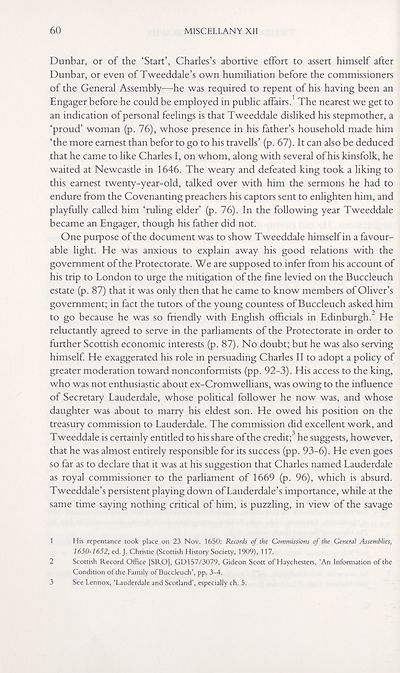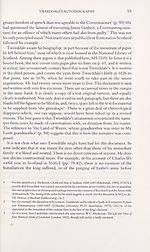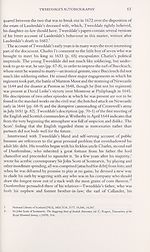Series 5 > Miscellany of the Scottish History Society, Volume 12
(71) Page 60
Download files
Complete book:
Individual page:
Thumbnail gallery: Grid view | List view

60
MISCELLANY XII
Dunbar, or of the ‘Start’, Charles’s abortive effort to assert himself after
Dunbar, or even of Tweeddale’s own humiliation before the commissioners
of the General Assembly—he was required to repent of his having been an
Engager before he could be employed in public affairs.1 The nearest we get to
an indication of personal feelings is that Tweeddale disliked his stepmother, a
‘proud’ woman (p. 76), whose presence in his father’s household made him
‘the more earnest than befor to go to his travells’ (p. 67). It can also be deduced
that he came to like Charles I, on whom, along with several of his kinsfolk, he
waited at Newcastle in 1646. The weary and defeated king took a liking to
this earnest twenty-year-old, talked over with him the sermons he had to
endure from the Covenanting preachers his captors sent to enlighten him, and
playfully called him ‘ruling elder’ (p. 76). In the following year Tweeddale
became an Engager, though his father did not.
One purpose of the document was to show Tweeddale himself in a favour¬
able light. He was anxious to explain away his good relations with the
government of the Protectorate. We are supposed to infer from his account of
his trip to London to urge the mitigation of the fine levied on the Buccleuch
estate (p. 87) that it was only then that he came to know members of Oliver’s
government; in fact the tutors of the young countess of Buccleuch asked him
to go because he was so friendly with English officials in Edinburgh.2 He
reluctandy agreed to serve in the parliaments of the Protectorate in order to
further Scottish economic interests (p. 87). No doubt; but he was also serving
himself. He exaggerated his role in persuading Charles II to adopt a policy of
greater moderation toward nonconformists (pp. 92-3). His access to the king,
who was not enthusiastic about ex-Cromwellians, was owing to the influence
of Secretary Lauderdale, whose political follower he now was, and whose
daughter was about to marry his eldest son. He owed his position on the
treasury commission to Lauderdale. The commission did excellent work, and
Tweeddale is certainly entitled to his share of the credit; he suggests, however,
that he was almost entirely responsible for its success (pp. 93-6). He even goes
so far as to declare that it was at his suggestion that Charles named Lauderdale
as royal commissioner to the parliament of 1669 (p. 96), which is absurd.
Tweeddale’s persistent playing down of Lauderdale’s importance, while at the
same time saying nothing critical of him, is puzzling, in view of the savage
1 His repentance took place on 23 Nov. 1650: Records of the Commissions of the Ceneral Assemblies,
1650-1652, ed. J. Christie (Scottish History Society, 1909), 117.
2 Scottish Record Office [SRO], GD157/3079, Gideon Scott of Haychesters, ‘An Information of the
Condition of the Family ofBuccleuch’, pp. 3-4.
3 See Lennox, 'Lauderdale and Scotland’, especially ch. 5.
MISCELLANY XII
Dunbar, or of the ‘Start’, Charles’s abortive effort to assert himself after
Dunbar, or even of Tweeddale’s own humiliation before the commissioners
of the General Assembly—he was required to repent of his having been an
Engager before he could be employed in public affairs.1 The nearest we get to
an indication of personal feelings is that Tweeddale disliked his stepmother, a
‘proud’ woman (p. 76), whose presence in his father’s household made him
‘the more earnest than befor to go to his travells’ (p. 67). It can also be deduced
that he came to like Charles I, on whom, along with several of his kinsfolk, he
waited at Newcastle in 1646. The weary and defeated king took a liking to
this earnest twenty-year-old, talked over with him the sermons he had to
endure from the Covenanting preachers his captors sent to enlighten him, and
playfully called him ‘ruling elder’ (p. 76). In the following year Tweeddale
became an Engager, though his father did not.
One purpose of the document was to show Tweeddale himself in a favour¬
able light. He was anxious to explain away his good relations with the
government of the Protectorate. We are supposed to infer from his account of
his trip to London to urge the mitigation of the fine levied on the Buccleuch
estate (p. 87) that it was only then that he came to know members of Oliver’s
government; in fact the tutors of the young countess of Buccleuch asked him
to go because he was so friendly with English officials in Edinburgh.2 He
reluctandy agreed to serve in the parliaments of the Protectorate in order to
further Scottish economic interests (p. 87). No doubt; but he was also serving
himself. He exaggerated his role in persuading Charles II to adopt a policy of
greater moderation toward nonconformists (pp. 92-3). His access to the king,
who was not enthusiastic about ex-Cromwellians, was owing to the influence
of Secretary Lauderdale, whose political follower he now was, and whose
daughter was about to marry his eldest son. He owed his position on the
treasury commission to Lauderdale. The commission did excellent work, and
Tweeddale is certainly entitled to his share of the credit; he suggests, however,
that he was almost entirely responsible for its success (pp. 93-6). He even goes
so far as to declare that it was at his suggestion that Charles named Lauderdale
as royal commissioner to the parliament of 1669 (p. 96), which is absurd.
Tweeddale’s persistent playing down of Lauderdale’s importance, while at the
same time saying nothing critical of him, is puzzling, in view of the savage
1 His repentance took place on 23 Nov. 1650: Records of the Commissions of the Ceneral Assemblies,
1650-1652, ed. J. Christie (Scottish History Society, 1909), 117.
2 Scottish Record Office [SRO], GD157/3079, Gideon Scott of Haychesters, ‘An Information of the
Condition of the Family ofBuccleuch’, pp. 3-4.
3 See Lennox, 'Lauderdale and Scotland’, especially ch. 5.
Set display mode to:
![]() Universal Viewer |
Universal Viewer | ![]() Mirador |
Large image | Transcription
Mirador |
Large image | Transcription
Images and transcriptions on this page, including medium image downloads, may be used under the Creative Commons Attribution 4.0 International Licence unless otherwise stated. ![]()
| Scottish History Society volumes > Series 5 > Miscellany of the Scottish History Society, Volume 12 > (71) Page 60 |
|---|
| Permanent URL | https://digital.nls.uk/127339653 |
|---|
| Description | Over 180 volumes, published by the Scottish History Society, containing original sources on Scotland's history and people. With a wide range of subjects, the books collectively cover all periods from the 12th to 20th centuries, and reflect changing trends in Scottish history. Sources are accompanied by scholarly interpretation, references and bibliographies. Volumes are usually published annually, and more digitised volumes will be added as they become available. |
|---|


